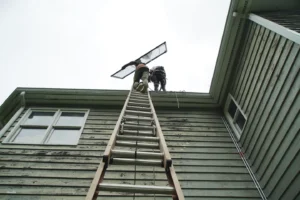Lawmakers Debate Potential New Election Integrity Laws
Campaign finance reporting, election intimidation and crossover voting part of reform discussions
- Published In: Politics
- Last Updated: Oct 30, 2023

Secretary of State Chuck Gray shakes hands as he is introduced before Gov. Mark Gordon’s speech to a joint session of the 67th Legislature in the House Chambers at the Wyoming State Capitol in January. Gray offered comments before the Joint Corporations, Elections & Political Subdivisions Committee on several pieces of elections-related laws last week. (Photo by Michael Smith)

By Carrie Haderlie
Special to the Wyoming Truth
Ahead of the 2024 campaign season, Wyoming lawmakers are considering a slate of laws aimed at regulating potentially contentious races in local, state and national elections.
In Cheyenne last week, the Joint Corporations, Elections & Political Subdivisions Committee voted to send several pieces of legislation to the state Legislature for deliberation during the Budget Session beginning Feb. 12, 2024. One would establish a misdemeanor penalty for election intimidation. Another would set 30-day durational residency requirements for new residents, and a third involves campaign reporting requirements.
The committee will not sponsor legislation aimed at clarifying last session’s adopted ban on crossover voting and tabled a bill dealing with electioneering near a polling place.
What’s moving forward
On Thursday, lawmakers voted to sponsor “Voter qualifications-durational residency requirement,” requiring voters to be Wyoming residents for 30 days or more before voting in an election. Rep. Sandy Newsome (R-Cody) asked whether a voter who moved into Wyoming at age 17, but turned 18 less than 30 days before an election, would be precluded from voting under the new statute.
“I’m not against durational residency,” Newsome said. “I’m wanting to clarify how this works in all scenarios [in a way] that makes it clear to the voter how this will work for them.”

Wyoming Secretary of State Chuck Gray said federal law allows such a person to register to vote in their state of origin. Similarly, he said, anyone who moved to Wyoming less than 30 days before an election is allowed, under federal law, to go back to their state of origin to vote in a presidential election. Before the committee voted to sponsor the draft legislation, Rep. Eric Barlow (R-Gillette) introduced an amendment that passed allowing a resident of less than 30 days to vote in Wyoming for a presidential election only.
In a draft bill called “Campaign reporting,” the committee also voted to expand the definition of what constitutes an “organization.” The new definition would require any one person who gathered funds from others to donate to a campaign to report as an organization during a primary, general or special election.
Gray expressed concern that the added requirement would “open the door to uncertainty and overbreadth” in reporting for people engaging in political speech, when the state already has reporting guidelines for political action committees (PACs).
Committee Co-chairman Jared Olsen (R-Cheyenne) said there’s a loophole in the state’s definition of a PAC, as it doesn’t include an organization without officers. Currently, that means an organization of one or two people isn’t required to report.
Committee Co-chairman Sen. Cale Case (R-Lander) referenced a 2o22 “Save Wyoming” rally held in Lander, where he said sponsors publicly aligned with now U.S. Rep. Harriet Hageman (R-Wyo.) and former President Donald Trump, as well as other local Republican candidates, did not report expenditures, because they weren’t an official PAC. He voted to support the legislation, saying that “in this time of dirty elections and less than full disclosure, and frankly, obfuscation of the facts, disclosure might be a good thing.”
When it comes to election intimidation, current Wyoming law only includes a felony offense. The committee voted unanimously in support of an “Election offenses-intimidation” draft bill that would break them into two categories: a misdemeanor charge for threats that induce fear in an election official or elector, but do not rise to the level of violence, and an amended felony offense for threats carried out to the point of violence. The penalty for a misdemeanor offense would not exceed six months in a county jail or a fine of $1,000.

Andy Craig, director of election policy Joseph Rainey Center for Public Policy, a self-described “post-partisan” nonprofit research organization, said election intimidation is a “number one issue.” Many incidents are “borderline cases” where prosecutors don’t feel a felony charge is appropriate, so Craig said he favors a misdemeanor charge.
Tabled and voted down
Crossover voting, or the ability for voters in Wyoming to switch political parties up to and ahead of a primary election, was significantly limited during the last Legislative session. After that effort, Gov. Mark Gordon stated his concern that a 2023 law was ambiguous.
Case said a draft bill, “Voter qualifications-durational residency requirement,” was written to clarify that a “brand new” voter in Wyoming could choose a party affiliation, even during the “blackout” dates created by the new law.
The draft legislation died in a 7-6 committee vote.
Wyoming Republican Party Executive Director Kathy Russell claimed crossover voting remains a concern in her party and said the proposed bill would “undo” legislation that passed last session. Sen. Brian Boner (R-Douglas) reiterated that it took a “very long time” to pass legislation limiting party switching.
“I think there is a general lack of trust out there, because this is still very fresh in people’s minds,” Boner said.
The committee also voted to table a draft bill called “Electioneering too close to a polling place,” a response related to an Oct. 23 Tenth Circuit Court decision overturning a lower court decision regarding First Amendment rights and electioneering. The bill would have changed the distance electioneering is allowed on Election Day at a polling place from 100 yards to 100 feet, but because the Tenth Circuit Court of Appeals issued its decision in late October, the committee deemed a new law unnecessary.
In 2020, Wyoming resident John C. Frank sued state and local officials, contending the electioneering statute violated his First Amendment rights. The lower court ruled a 100-yard distance buffer zone where electioneering was prohibited on Election Day was arbitrary and “overbroad,” as it violated the rights of third parties like Frank who could not display campaign signs on private property in that buffer zone.
Laramie County Clerk Debra Lee, who was named as defendant in the case, told the committee the state’s county clerks “were getting nervous” that no enforceable law existed heading into another election year, so they requested the draft bill.
However, the recent decision ruling a 100-yard distance on Election Day is constitutionally acceptable means restrictions remain 100 feet on all other days, although the Tenth Circuit Court remanded that decision back to the lower court.













